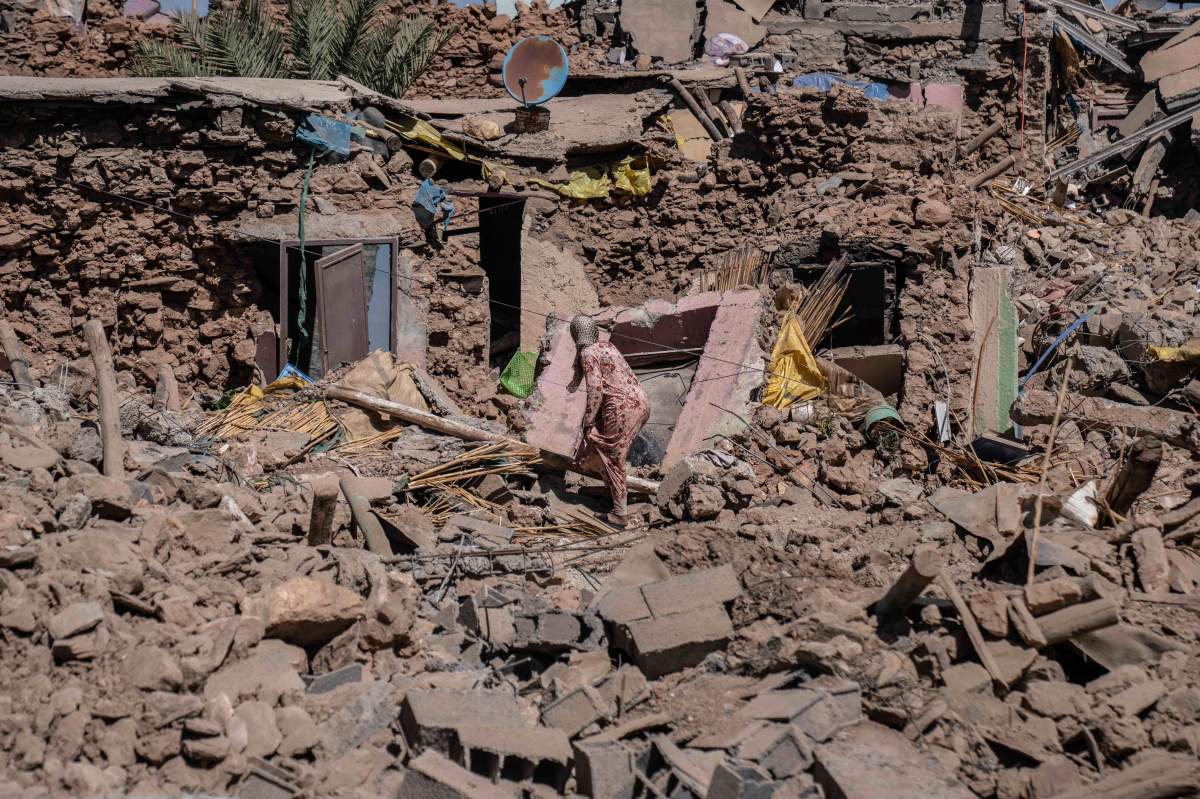Blankets hang from the fences surrounding a city lot now home to many makeshift tents in the Marrakech following the 6.8 magnitude earthquake that devastated Morocco on Friday.

Among the earthquake survivors is Dounia Koukaz, who is trying to care for her newborn daughter.
“Of course, I need to go back home as soon as possible because she got sick with the wind and cold that hit her here in the street,” Koukaz told Global News through an interpreter.
Many homes in Marrakech’s historic quarter of Medina are over 200 years old and made of clay and rock. Government inspectors have been telling residents that they have to leave due to the homes no longer being safe following the earthquake.
However, residents are reluctant to leave as many don’t have anywhere else to go but the streets.
The earthquake’s epicentre was in the Atlas Mountains, about 72 kilometres south of Marrakech, with many mountain villages left devastated including Marigha.

Here, residents told Global News they have been on their own to try and rescue survivors and pull the dead from the rubble. They say they don’t know if the government will help them rebuild or check on them.
Members of the Moroccan Parliament convened Monday to create a government fund for earthquake response at the request of King Mohammed VI.
Moroccan Prime Minister Aziz Akhannouch said afterward that the government is committed to compensating victims and helping them rebuild. Enaam Mayara, the president of Morocco’s House of Councilors, said that it would likely take five or six years to rebuild in some affected areas.

The death toll of the devastating earthquake that struck Morocco on Friday continues to rise.
The 6.8-magnitude earthquake is the strongest to hit Morocco in over a century. As of Tuesday, 2,901 deaths have been reported, along with over 2,500 injuries. Several aftershocks followed the initial tremor.

Get breaking National news
For emergency crews and volunteer rescuers on the ground, the hope of finding survivors in the rubble is diminishing.
“There’s quite a few different tractors and forklifts driving around, trying to move the rocks away to see if we can we can find people trapped underneath,” said John Johnson of Doctors Without Borders Canada.
“The most acute phase of that is probably over now. And it’s looking less and less likely that we’ll find anyone alive, But they might still be able to find dead bodies to properly bury them.”
Johnson said the more modern buildings in cities like Marrakech held up pretty well, but smaller villages didn’t have the same fortune.
“A lot of the traditional buildings and the smaller villages have just been completely destroyed. There’s nothing left but the rubble and rocks,” he said.
The Moroccan government is limiting the number of countries it is accepting rescue-focused foreign aid from, and is now accepting assistance from Spain, Qatar, Great Britain and the United Arab Emirates.
Foreign Affairs Minister Melanie Joly told Global News on Sunday that Canada is standing by should an offer to help be accepted. The United States, France and the European Union are in a similar stance.

Over the weekend, she encouraged Canadians in the country to register with Global Affairs Canada if they need emergency assistance.
The country is welcoming help from non-governmental aid organizations, including the Toronto-based GlobalMedic.
Right now, two members of their rapid response team are in Marrakech, distributing food to people who came to the city and are now living in tents.
“People were just very grateful just to get, you know, a simple sandwich and like some bananas and apples,” Alanna Marchese, GlobalMedic’s emergency programs director, told Global News.
“They’re sitting on the street. They don’t really know what to do next. And a lot of them are scared to go back into their homes for fear of aftershocks.”
Marchese said the next stage of GlobalMedic’s relief plans involves heading to local hospitals and clinics to set up water purification systems and expand their meal deliveries.
“People here are still probably going to be living in makeshift tents. People are not going to have enough food to eat, people may not have clean water. So GlobalMedic is prepared to run these programs for as long as they’re needed,” she said.
She said the hospitals are being “inundated” with people looking for help so they want to provide relief as people wait.
In Toronto, GlobalMedic executive director Rahul Singh said water purification units are essential when large amounts of people are displaced to avoid a twin medical emergency.

“So if we make sure people have access to clean drinking water, then there’s not thousands of patients showing up with acute watery diarrhea because they got sick because of the water,” Singh explained.
Residents in most places have been provided food and water, and most of the giant boulders blocking steep mountain roads have been cleared.
But worries remain about shelter, particularly with forecasts predicting rain early this week.
— with files from Global News’ Crystal Goomansingh, Redmond Shannon and Katherine Ward, The Canadian Press, and Reuters
- U.S. judge rules Trump policy on deportation of migrants as unlawful
- Missing North Carolina woman who vanished 24 years ago found ‘alive and well’
- Cuba says its forces killed 4 on U.S. speedboat after returning fire
- Indian government no longer targeting Canadians, senior official says on eve of PM’s visit









Comments
Want to discuss? Please read our Commenting Policy first.